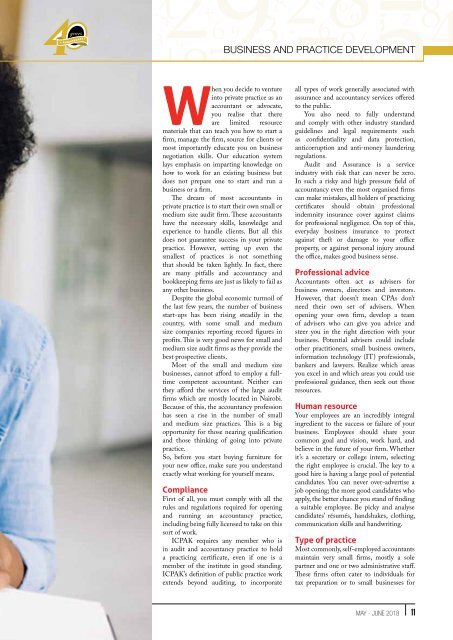May-June-issue
Create successful ePaper yourself
Turn your PDF publications into a flip-book with our unique Google optimized e-Paper software.
BUSINESS AND PRACTICE DEVELOPMENT<br />
When you decide to venture<br />
into private practice as an<br />
accountant or advocate,<br />
you realise that there<br />
are limited resource<br />
materials that can teach you how to start a<br />
firm, manage the firm, source for clients or<br />
most importantly educate you on business<br />
negotiation skills. Our education system<br />
lays emphasis on imparting knowledge on<br />
how to work for an existing business but<br />
does not prepare one to start and run a<br />
business or a firm.<br />
The dream of most accountants in<br />
private practice is to start their own small or<br />
medium size audit firm. These accountants<br />
have the necessary skills, knowledge and<br />
experience to handle clients. But all this<br />
does not guarantee success in your private<br />
practice. However, setting up even the<br />
smallest of practices is not something<br />
that should be taken lightly. In fact, there<br />
are many pitfalls and accountancy and<br />
bookkeeping firms are just as likely to fail as<br />
any other business.<br />
Despite the global economic turmoil of<br />
the last few years, the number of business<br />
start-ups has been rising steadily in the<br />
country, with some small and medium<br />
size companies reporting record figures in<br />
profits. This is very good news for small and<br />
medium size audit firms as they provide the<br />
best prospective clients.<br />
Most of the small and medium size<br />
businesses, cannot afford to employ a fulltime<br />
competent accountant. Neither can<br />
they afford the services of the large audit<br />
firms which are mostly located in Nairobi.<br />
Because of this, the accountancy profession<br />
has seen a rise in the number of small<br />
and medium size practices. This is a big<br />
opportunity for those nearing qualification<br />
and those thinking of going into private<br />
practice.<br />
So, before you start buying furniture for<br />
your new office, make sure you understand<br />
exactly what working for yourself means.<br />
Compliance<br />
First of all, you must comply with all the<br />
rules and regulations required for opening<br />
and running an accountancy practice,<br />
including being fully licensed to take on this<br />
sort of work.<br />
ICPAK requires any member who is<br />
in audit and accountancy practice to hold<br />
a practicing certificate, even if one is a<br />
member of the institute in good standing.<br />
ICPAK’s definition of public practice work<br />
extends beyond auditing, to incorporate<br />
all types of work generally associated with<br />
assurance and accountancy services offered<br />
to the public.<br />
You also need to fully understand<br />
and comply with other industry standard<br />
guidelines and legal requirements such<br />
as confidentiality and data protection,<br />
anticorruption and anti-money laundering<br />
regulations.<br />
Audit and Assurance is a service<br />
industry with risk that can never be zero.<br />
In such a risky and high pressure field of<br />
accountancy even the most organised firms<br />
can make mistakes, all holders of practicing<br />
certificates should obtain professional<br />
indemnity insurance cover against claims<br />
for professional negligence. On top of this,<br />
everyday business insurance to protect<br />
against theft or damage to your office<br />
property, or against personal injury around<br />
the office, makes good business sense.<br />
Professional advice<br />
Accountants often act as advisers for<br />
business owners, directors and investors.<br />
However, that doesn’t mean CPAs don’t<br />
need their own set of advisers. When<br />
opening your own firm, develop a team<br />
of advisers who can give you advice and<br />
steer you in the right direction with your<br />
business. Potential advisers could include<br />
other practitioners, small business owners,<br />
information technology (IT) professionals,<br />
bankers and lawyers. Realize which areas<br />
you excel in and which areas you could use<br />
professional guidance, then seek out those<br />
resources.<br />
Human resource<br />
Your employees are an incredibly integral<br />
ingredient to the success or failure of your<br />
business. Employees should share your<br />
common goal and vision, work hard, and<br />
believe in the future of your firm. Whether<br />
it’s a secretary or college intern, selecting<br />
the right employee is crucial. The key to a<br />
good hire is having a large pool of potential<br />
candidates. You can never over-advertise a<br />
job opening; the more good candidates who<br />
apply, the better chance you stand of finding<br />
a suitable employee. Be picky and analyse<br />
candidates’ résumés, handshakes, clothing,<br />
communication skills and handwriting.<br />
Type of practice<br />
Most commonly, self-employed accountants<br />
maintain very small firms, mostly a sole<br />
partner and one or two administrative staff.<br />
These firms often cater to individuals for<br />
tax preparation or to small businesses for<br />
MAY - JUNE 2018 11

















